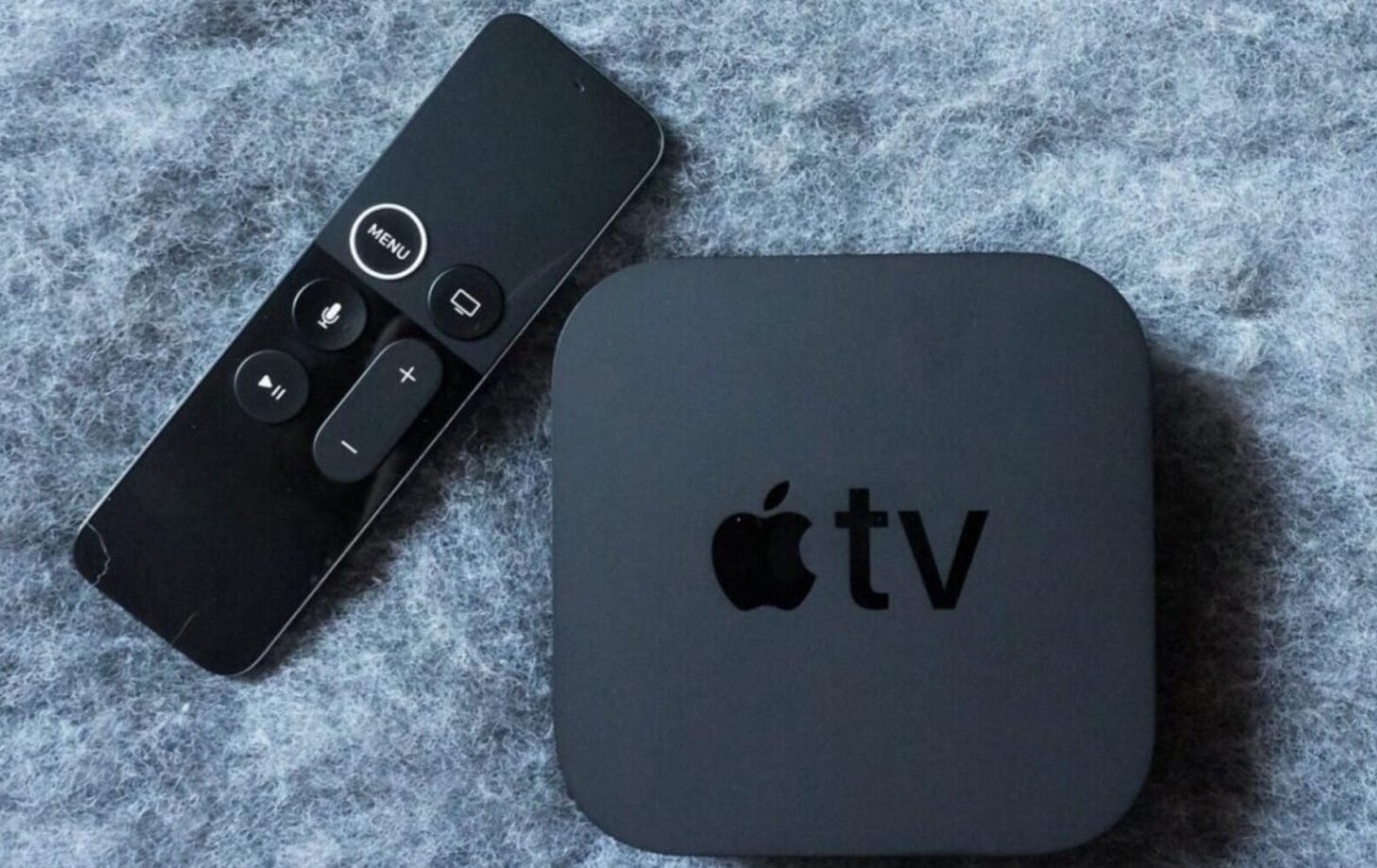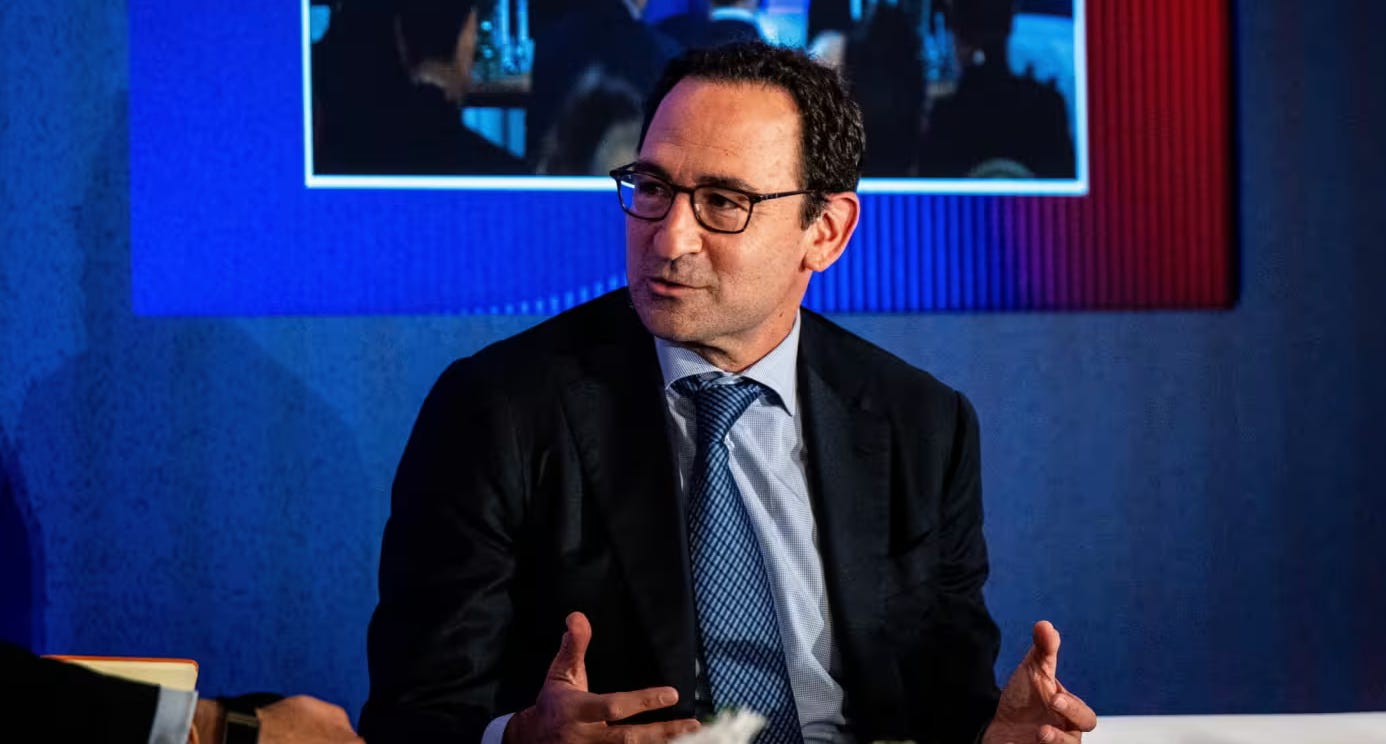Go with the flow
Sometimes your clients will disregard your best laid product naming plans. And that's okay.
Issue № 145 | London, Sunday 19 October 2025
Read on to learn why:
① Product marketers need a coherent, clear and compelling naming framework.
② The customer is always right.
③ Earnings reports only ever tell a short and backward looking part of the story.
④ The disruption that AI will cause is still misunderstood and underestimated.
⑤ Picking an enemy is a compelling way to differentiate yourself.
⑥ We need big ideas distilled into pithy talks more than ever.
⑦ Marketers should influence product.
What's new
This week, Apple subtracted the ‘Plus’ from its ‘TV’ and left everyone confused as Hell, reports Gizmodo.

In short:
“Apple is rebranding Apple TV+ to, simply, ‘Apple TV.’ Why minus the plus? It seems that the California company has a broader idea of where it can take its tvOS and Apple TV app (not to be confused with the streaming service, or the physical device, that now share its name).”
“Apple itself isn’t helping anyone disentangle its name change, clarifying merely that ‘Apple TV is available on the Apple TV app.’ In any other context, that recursive logic would be equivalent to Futurama’s Philip J. Fry saying, ‘I’ve got one nail and another nail to nail it in with’.”
“It would be understandable if Apple were growing weary of other companies stealing its ‘Plus, Pro, and Pro Max’ branding.”
Why it matters
① Spare a thought for Apple’s product marketers. Faced with an ever-broadening product portfolio, one of their many challenges is adopting a coherent, clear and compelling naming framework. This should explain both the relationship between products and their hierarchy. In this case, they had meticulously drawn a distinction between the app people use to watch content (Apple TV), the hardware that app *can* (but doesn’t have to - other hardware is also available) run on (Apple TV 4K), and the premium tranche of content that they could pay for separately (Apple TV+).
And yet, Apple is now throwing that away. So, this story matters because the move flies in the face of product branding best-practice. In its quest for simplicity, Apple seems to have jettisoned the differentiation between its set-top box, its app, and its steaming service. They now all share the same name despite being completely different things.
② But here’s the thing: customers never cared. They all universally referred to the streaming service as “Apple TV”. When there is a disconnect between your best laid product naming plans and what your customers actually end up calling your products, at some point you may have to concede defeat. The customer, after all, is always right. Apple’s vice president of services, Eddy Cue, admitted as much in a recent interview with The Verge:
“The Plus was included in the original name because that’s what Apple uses to distinguish the paid versions of its free services, such as iCloud Plus and News Plus. ‘We stayed consistent because of it, but we all called it Apple TV, and we said, given where we are today, it’s a great time to do it, so let’s just do it,’ said Cue.”
What to do about it
Take action
Sometimes your clients will decide what something should be called, regardless of how intellectually pure or clear your original thinking was. Sometimes, just sometimes, it’s best to go with the flow.
(Except - of course - for times like, in the case of the “iWatch” or “iPhone X” rather than “10”, when they were very clearly wrong!)
Get help
Two ways I can help you: 1) hire me as a full-time member of your team; or 2) use InMarketing, an advisory service for senior leadership teams in finance and tech.
🔎 Audit 🧭 Strategy 🖋️ Positioning ✅ Planning 🤷🏻 Problem-solving ☎️ Counsel
Top stories
The other articles that are worthy of your time.
FINANCIAL SERVICES
America’s bankers are riding high. Why are they so worried?
③ Earnings reports only ever tell a short and backward looking part of the story.

“It might seem like a wonderful time to be an American investment bank. Over the past year, the country’s lenders have handed shareholders gains of 27%, far outstripping the 10% for other stocks outside the technology sector. They have ridden a wave of strong interest income, heavy trading and a surge in dealmaking. Soon they will face less red tape, too. Viewed in this light, conditions could hardly be better. Squint a little, though, and things are starting to look rather less rosy.”
“Both Jamie Dimon and David Solomon, bosses of JPMorgan and Goldman respectively, warned of frothy markets. Mr Solomon noted ‘a fair amount of investor exuberance’. Mr Dimon went further, saying the collapse of Tricolor and First Brands could be signs of worse to come. ‘When you see one cockroach, there are probably more,’ he warned. The bank’s shares dipped by 2%, and it raised its provision for credit losses by 9%, to $3.4bn.”
“If the wobbles in private markets die down, tariffs do not tank the economy and the artificial-intelligence boom does not turn into a bust - three admittedly big ‘ifs’ - then lenders will be well-placed to make the most of a wave of Trumpian deregulation. Bank executives are excited about the loosening of capital requirements resulting from a range of rules due to be changed over the coming years. Should such changes materialise, analysts believe they may unlock more than $200bn in capital. America’s top bankers may, in other words, shortly be in reach of a prize they have chased for years.”
TECHNOLOGY
Blackstone says Wall Street is complacent about AI disruption
④ The disruption that AI will cause is still misunderstood and underestimated.

“Wall Street investors are underestimating artificial intelligence’s potential to make entire industries obsolete, Blackstone’s president has said, adding that the impact of the technology was now ‘top of our list’ when evaluating deals.”
“High valuations of lossmaking AI companies, and the circular financial relationships between many key players, have fuelled concerns about a bubble in the sector. Gray said investor exuberance meant it was inevitable that there would be some misallocation of capital to AI companies. But he added that the scale of the technology’s impact meant investors may still underestimate its potential to crush entire industries.”
“‘People say, this smells like a bubble, but they’re not asking: What about legacy businesses that could be massively disrupted?’ said Gray. ‘If you think about rules-based businesses — legal, accounting, transaction and claims processing — this is going to be profound,’ he added.”
MEDIA & MARKETING
If your marketing sucks, do this
⑤ Picking an enemy is a compelling way to differentiate yourself.
“OpenAI launches Sora 2. It generates AI videos. Everyone in tech got excited. Then people realize what this enables: mass-produced AI content. Twitter had a new word for it: ‘slop’. That’s when Anthropic saw an opportunity. They launched their ‘Keep Thinking’ campaign and popup coffee shop. The entire positioning became anti-slop. Against AI-generated garbage. For actual human thinking. Keep thinking.”
“Anthropic did something smart: They said Claude is for ANYONE who thinks. Not businesses. Not productivity seekers. Just people who think.
Now everyone uses Claude - artists, writers, lawyers, students. One billboard says: ‘There has never been a better time to have a problem’.”
“The 3 bold moves they made”
Went full opposite direction: the courage to say the opposite of what their competitors are saying.
Made it physical: They opened the coffee shop I mentioned for one weekend.
Celebrated the person, not the product: Their ads don’t say ‘Claude is smart’. They say ‘YOU think. We help’. That’s the entire difference.”
WILDCARD
TED gets new bosses and changes direction
⑥ We need big ideas distilled into pithy talks more than ever.

“On October 15th TED unveiled a management transition, not a financial one. It named Sal Khan, the boss of Khan Academy, a free online learning site, as its ‘vision steward’ (a very TEDster title). It also promoted Logan McClure Davda, hitherto ‘head of impact’ (ditto), to chief executive.”
“The two organisations plan to work together. Both are in different parts of the education-technology business: one aiming videos at children, the other at adults. […] The union is being presented as a way for two leading promoters of reliable information and critical thinking to combat a crisis of trust and AI slop online.”
“TED’s changes come amid darker times, at a point when the era of do-gooder globalism ebbs into polarised populism. Funders are retreating from progressive causes that defined the organisation’s ethos. The business of in-person events is booming: people working from home a lot are using conferences to make human connections they would otherwise lack. But the world of online video that emerges from those events has shifted. TED will need to reinvent its compact talks for an age of even tighter, two-minute TikToks.”
Off cuts
The stories that almost made this week’s newsletter.
FINANCIAL SERVICES
⚠️ First Brands is a painful but necessary warning for Wall Street
🇪🇺 Merz calls for pan-European stock exchange
🍾 Morgan Stanley and BofA smash forecasts with investment bank results
☣️ Revolut’s full UK banking licence held up by concerns over global risk controls
📈 The remarkable redemption of St James’s Place
TECHNOLOGY
🙊 PayPal’s blockchain partner accidentally minted $300 trillion in stablecoins
♵ BoE to prioiritise AI, DLT and quantum computing in tech strategy
💰 S&P Global to buy private markets data firm for $1.8bn
🤖 New California law requires AI to tell you it’s AI
🪙 FCA supports tokenisation in asset management
MEDIA & MARKETING
📓 Why your B2B strategy should start with a story that builds trust
⚽️ Why fintechs are betting on sports sponsorships to win European markets
📲 How digital visibility drives — or destroys — brand trust
📰 Techcrunch founding editor at large Mike Butcher launches new title
🎓 What are the skills marketers should develop as we enter 2026?
The last word
⑦ Thomas Barta on why marketers should influence product:

“Your unfair advantage is the voice of the customer. […] Champion the upgrade that makes a customer smile. Fight for the small detail that keeps people loyal.”
Don’t settle for marketing.
Aspire to InMarketing.
Wishing you an innovative week,





